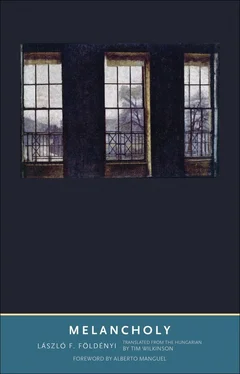In the course of his lectures he would usually look at a nearby member of the audience in order, so to say, to read from the face if he had been understood. At such times he would be troubled by the most insignificant trifle, especially if it disturbed the natural or accepted order of things and thereby upset the order of his train of thought as well. In one of his lectures his absent-mindedness became singularly apparent. At noon Kant informed me that he was continually getting stuck in his thoughts because a button was missing from the coat of one of the members of the audience seated directly in front of him. His attention and his thoughts kept returning to it unwittingly, and that was why he became so absent-minded.
(quoted in Groß, Immanuel Kant , 135)
Kant’s near-pathological partiality for neatness was also noted by Wasianski, another of the biographers:
Over the long course of years he developed his own settled, invariable way of living to such an extent that he was perturbed if a pair of scissors or a penknife lay on the table at another angle from the usual direction, especially if it had slipped an inch or two; and if the place of one of the larger objects, such as a chair, was changed in his room, to say nothing of the number of seats being increased or reduced, then he would become completely discomposed, with his attention continually returning to the place of the chair until order was fully restored.
(ibid.)
Disarray, an eternal threat to order, is the source of melancholia that undermines life at its foundations; but since sooner or later everything gets mixed up anyway, disorder is not so much the cause as the consequence of melancholia: obsessed with order, man comes across melancholia and ends up disrupting the ties of order himself. Kierkegaard was convinced that despondency would help the man who lived in secure circumstances in a crowded city to find his way back to the basic principles of life, which, in his view, were truly felt only by those who lived in solitude — and by sailors. Likewise, Walter Benjamin, in writing about well-ordered and planned metropolises, found that it was the prostitutes loitering in the gateways of Berlin tenements or on railway platforms who provided a glimpse into nothingness from a secure life. Beyond a certain point, order is not merely practical neatness but an intolerable prison. An angrily destructive melancholic carries out a kind of prison revolt. In
The House of the Dead
, Dostoevsky reports on murderers who for decades had been decent, reliable villagers; beyond their taciturnity, nothing about them indicated that one day, all of a sudden, they would pick up an axe and slaughter their best friends. There is no necessity to commit mayhem, however; there are other ways of revolting against order. According to Dr. Watson, “Save for the occasional use of cocaine, [Sherlock Holmes] had no vices, and he only turned to the drug as
a protest against the monotony of existence when cases were scanty and the papers uninteresting.”
10
Melancholia is not an uprising, a revolt, or a reconciliation: the sense of the world is depleted in the eyes of the melancholic, and therefore, terrified as he is of disorder, he is also unable to become preoccupied with order. Günter Grass, who subjected melancholia to a searching inquiry, wrote in his journal that in our time, melancholia is to be found at the conveyor belt, discerning its cause in the fact that production quotas have become the determining principle of life (Grass, From the Diary of a Snail , 254). 11Life at the conveyor belt does not necessarily lead to melancholia, however; apathy is not the same as melancholia: for that, a breakaway from order is also required. Whether the melancholic has to part with an object or a loved one, he feels that he is confronting nothingness: for him, the possibility of breaking away is proof that the coherence of the orderly world is just apparent, and sooner or later everything will fall to bits. Melancholia does not emerge from sheer order (which does not exist anyway) but out of the inevitable cracks concealed in order. One truly experiences the pain of loss only if one has a strong link to whatever has been lost, and that same response applies to a loss of order: the melancholic must make a superhuman effort to preserve order, he must be well aware of what has been lost, and he must perceive that he did everything he could on his part to protect his life from being threatened (before rebelling against his fate, Hercules first completed all his labors, set the world to rights in his own fashion). It is telling that in the Middle Ages, mathematicians and geometricians were considered to be melancholic. 12Tertullian called the genii of mathematicians and astrologers fallen angels (in the Middle Ages, melancholia was a sin), and Henry of Ghent differentiated two types of people: those who are capable of stepping out of the domain of finitude and of thinking about transcendent beings such as angels, and those who, remaining prisoners of the empirical world, feel comfortable only in a directly and transparently perceivable world. The latter will become melancholics: “Whatever they think, it is something spatial ( quantum ), or else it is located in space like a point. Such people are therefore melancholic, and make the best mathematicians, but the worst metaphysicians” (quoted in Benjamin, German Tragic Drama , 227). (Mathematicians are sad, Martin Luther said, and in Dürer’s Melencolia I there are instruments alluding to geometry.) Mathematicians organize the world and then become disconsolate: the only way out of the prison leads to nothingness.
A change in a well-regulated life is perceived by a melancholic as all-engulfing disarray. The more they cling to order, the more readily they lose their footing: a torn-off shirt button is enough to reveal the purposelessness of existence. In the unanimous opinion of psychiatrists, before the appearance of melancholia the majority of melancholics experienced an upsetting of order; this might have taken the form of menopause, involution, menstruation, childbirth, release from an oppressive psychological burden(!), a change in workplace, a family breakup, or moving to a different house (even if the new residence is better in every respect, since, after all, a home is not just a physical space but also an existential arrangement). Melancholics will do their utmost to ward off a change in life: from the outset, they arrange their lives so as to avoid losses. Psychiatrists have observed that the “melancholic type” is brought up from childhood to be performance- and order-oriented, so later on he does everything for himself and does not let others do anything for fear that his non-viability will come to light — though it is likely that the real cause is terror that in the absence of his personal control extending to the minutest detail, a chink may be left in the fabric of existence that will subsequently lead to the disintegration of everything. The terror extends to everything and closes in on itself; the very possibility of terror paralyzes the melancholic. Terror is regarded as inseparable from the world, from which he would like to withdraw definitively. The melancholic strives to overcome every random accident or unexpected development, which is to say that he is willing to conceive of life only as orderliness, yet he is bound to experience that his own personality is the chief obstacle to ultimate orderliness. For if the personality could be set in order existentially, then it would not be a personality but a machine; on the other hand, if the ultimate disorderliness of life were to be recognized, then life would lose its meaning: why bother to sew on a shirt button if the ultimate prospect is disorder? (According to Diogenes Laertius, Heraclitus did not complete some of his works due to melancholia, rather like the housewife who stopped washing clothes because of the same affliction.) The crack through which a melancholic steps out into nothingness comes into being within order: the compulsion to create order is attended by an intensified loathing, leads to respect for authority, commands adherence to family bonds, holds moral order in respect, implies a great demand for performance and for giving up striving for the impossible. (How much more docile today’s melancholic has become compared with one from the Romantic era!) Hidden behind all this lies an unacknowledged dread: the melancholic, as was shown by Franz Kafka, does not respect authority because he fears it, but because if he did not respect it then existence itself would become meaningless. Boundaries would cease to exist, and the alienation that he most fears would irrupt into his life. In this case, respect for authority is a flight from nothingness, from horror. Only melancholics feel true respect for authority: they will sincerely bend the knee to someone they may just as sincerely hold in contempt. And the same goes for the avoidance of conflicts, family, articles of faith, etc.: the seemingly mutually exclusive traits of perspicacity and resignation, sensitivity and willingness to compromise, merge in them, only to degenerate in the end into “incomprehensible” suicide, “mere” change, or “unwarranted” sorrow. In point of fact, the melancholic is characterized by a simultaneous love of freedom and terror of freedom: he does not feel free in his actions, because order binds him hand and foot, yet he does not dare strive for freedom — for unequivocal self-realization, fearless confrontation with mortality. A melancholic patient declared to her physician: “I have always looked for order, it is gratifying to me. It protects against disorder, uncontrolled behavior, anarchy, and against sin.” The patient then meant to say, “Satan is the representative of disorder in the soul,” but making a slip of the tongue said instead: “Satan is the representative of order in the soul” (quoted in Tellenbach, Melancholy , 209).
Читать дальше












